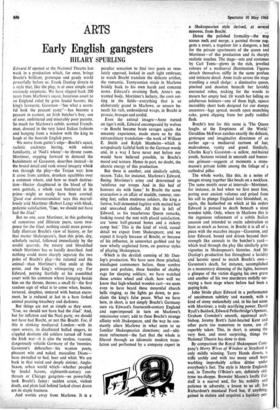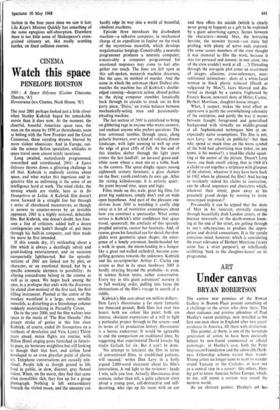Early English gangsters ARTS
HILARY SPURLING
Edward II opened at the National Theatre last week in a production which, for once, brings Brecht's brilliant, grotesque and gaudy world powerfully before us. Frank Dunlop directs in a style that, like the play, is at once simple and curiously enigmatic. We have slipped back 200 years from Marlowe's suave, luxurious court to an England ruled by grim feudal barons; the king's favourite, Gaveston—'See what a scorn- ful look the peasant casts!'—has become a peasant in earnest, an Irish butcher's boy, son of sour, embittered and miserably poor parents.
So much for Marlowe's subtle, scented French- man, dressed in the very latest Italian fashions and hanging from a window with the king to laugh at the boorish English peers.
We move from gutter's edp--Brecht's squat, rachitic cockneys leering, with odious familiarity, at `Ned's whore'—to throne room.
Mortimer, stepping• forward to demand the banishment of Gaveston, describes instead—in the brutal detail and rank sexual imagery which run through the play—the Trojan war: how it arose from aimless, drunken squabbles over a common whore, and how so much destruc- tion—Hector slaughtered in the blood of his own genitals, a whole race butchered, in its prime—might so easily have been averted. 'Quod erat demonstrandum' says this marvel- lously arid Mortimer (Robert Lang) with bleak, pedantic satisfaction, 'Tale, we should not have had the Iliad.'
But no one, save Mortimer, in this gathering of rancorous and illiterate peers, cares two- pence for the Iliad; nothing could more power- fully illustrate Brecht's view of history, or for that matter Shakespeare's, than this prim, dry, scholarly recital, followed immediately by the sordid quarrels, the misery and bloodshed which Mortimer has so lucidly described. And nothing could more sharply separate the two poles of Brecht's play—the rational and the animal—than Mortimer's thin smile at this point, and the king's whimpering cry. For Edward, peering fearfully at his assembled court with his common whore lounging beside him on the throne, throws a small fit—the first random sign of what is to come when, beaten, tortured, sleepless, smeared with human excre- ment, he is reduced at last to a bare forked animal praising treachery and darkness..
But things are not as simple as they seem. 'True, we should not have had the Iliad.' And, but for inflation and the Nazi party, we should not have had Brecht, or not this Brecht. For, if this is stinking mediaeval London—with its open sewers, its disaffected ballad singers, its crippled destitute old soldiers turned off from the Irish war—it is also the restless, raucous, dangerously volatile Germany of the 'twenties. Gaveston's debauches—his wanton poets, pleasant wits and naked, masculine Dians- have dwindled to bed, beer and whist. We are back in that weird and deeply sinister, Anglo- Saxon, urban world which—whether peopled by feudal barons, eighteenth-century cut- throats or Chicago gangsters—so powerfully took Brecht's fancy: sudden arrest, violent death, and plots laid behind locked closet doors are its staple business.
And worlds away from Marlowe. It is a peculiar sensation to find two poets so reso- lutely opposed, locked in such tight embrace; to watch Brecht translate the delicate artifice, the romantic, Tennysonian strain in Marlowe briskly back to his own harsh and concrete terms. Edward's straining flesh, Anne's un- wanted body, Mortimer's lechery, the corn rot- ting in the fields—everything that is so elaborately grand in Marlowe, or unseen be- neath his rich, embroidered wraps, in Brecht is prosaic, brusque and sordid.
Even the animal images—Anne nursed on tiger's milk, Edward encompassed by wolves —in Brecht become brute savages again. An uncanny experience, made more so by this extraordinary translation—the work of William E. Smith and Ralph Manheim—which is scrupulously faithful both to the German words and, in a way I have never met before nor would have believed possible, to Brecht's mood and texture. Hence in part, no doubt, the electric energy of this production.
But there is another, and similarly subtle, reason. Take, for instance, Marlowe's Edward, fleeing Mortimer's army and determined to 'reinforce our troops And in this bed of honours die with fame.' In Brecht the same evacuation is an affair of muddle, rumour, run- ning feet, sullen mutinous soldiers, the king a furtive, half-demented fugitive with 'matted hair and unwashed clothes. All that is left of Edward, as his treacherous Queen remarks, looking round the tent with placid satisfaction, are 'some half-gnawed bones and a rickety camp bed.' This is the kind of vivid, casual detail we expect from Shakespeare; and we expect it largely because of Brecht, or because of his influence, in somewhat garbled and by now wholly anglicised form, on postwar styles of playing Shakespeare, 'Which is the devilish cunning of Mr Dun- lop's production. We have seen these pinched, misshapen commoners before, these sombre peers and prelates, these bundles of shabby rags for sleeping soldiers; we have watched these armies wheel and clash, how well we know that high-wheeled wooden cart—we seem even to have heard these mournful church bells ringing, as the lights go down, to pro- claim the king's false peace. What we have here, in short, is not simply Brecht's Germany seen via Edward's fourteenth-century England and superimposed in turn on Marlowe's renaissance court; add to these Brecht's strange affinity with Shakespeare, and the way he con- stantly alters Marlowe in what seem to us familiar Shakespearian directions; and—ulti- mate refinement—the fact that the whole is filtered through an idiomatic modern trans- lation and performed by a company expert in a Shakespearian style derived, at several removes, from Brecht. • Hence the polished formality—the way scenes melt and merge, a painted throne sug- gests a court, a trapdoor for a dungeon, a bed for the private apartments of the queen and Mortimer—of this production and its sharply realistic touches. The stage—sets and costumes by Carl Toms—glows in the rich, jewelled colours of a mediaeval illumination. Figures detach themselves stiffly in the same profuse and intricate detail. Anne trails across the stage trundling a small sledge: a diminutive queen, pinched and desolate beneath her lavishly encrusted robes, making for the woods to mourn her empty bed. Or watch her lolling on adulterous bolsters—one of these high, square incredibly short beds designed for our dumpy ancestors—legs spread, mouth open munching cake, gown slipping from her puffy raddled flesh.
Brecht's text for this scene is 'The Queen laughs at the Emptiness of the World.'
Geraldine McEwan catches exactly the delicate, grotesque and imaginative directness of an earlier age—a mediaeval cartoon of lust, malevolence, vanity and greed. Simila Charles Kay's Gaveston—a sallow, red-haired youth, features twisted in uncouth and 'humor- ous grimace—suggests- moments a stone- mason's private foible am ong the foliage of a cathedral pillar.
The whole works, like this, in a series of images strung together like beads on a necklace.
The same motifs recur at intervals—Mortimer, for instance, in bed when we first meet him, poring over ancient volumes and prised from his cell to plunge England into bloodshed; or, again, the featherbed on which at his orders Edward is pressed to death beneath a stout wooden table. Only, where in Marlowe this is the ingenious refinement of a subtle Italian assassin and intended to excite admiration at least as much as horror, in Brecht it is all of a piece with the macabre images--Gaveston, and later Edward, bound and driven beyond their strength like animals to the butcher's yard— which trail through the play like similarly grim vignettes in Shakespeare's histories. And Mr Dunlop's production has throughout a lucidity and laconic speed to match Brecht's own- Gaveston's death, for instance, accomplished in a momentary dimming of the lights, between a glimpse of the victim digging his own grave and another of his two murderers stolidly sur- veying a bare stage where before had been a gaping hole.
John Stride plays Edward in a performance of unccimmon subtlety and warmth, with a kind of stony melancholy and, in his last scene with Mortimer, a truly scarifying power. David Ryan's Baldock, Edward Petherbridge's Spencer, Graham Crowden's smooth, equivocal arch- bishop, Jeremy Brett's faint-hearted Kent and other parts too numerous to name, are all superbly taken. This, in short, is among the very best, and most surprising, things the National Theatre has done to date.
By comparison the Royal Shakespeare Com- pany's Merry Wives of Windsor at Stratford is only mildly winning. Terry Hands directs, a trifle archly and with too many small boys warbling improbably artless ditties under everybody's feet. The style is Merrie Englande and, in Timothy O'Brien's sets, definitely old- tyme tea-shoppe. Brewster Mason's lordly Fal- staff is a marvel and, for his nobility and patience in adversity, a lesson to us all; Ian Richardson's maniacal Ford has, if anything, gained in stature and acquired a lapidary Per- fection in the four years since we saw it last; Lila Kaye's Mistress Quickly has something of the same egregious self-absorption. Elsewhere there is too little sense of Shakespeare's cross- grained citizenry set, like madly scuttling beetles, on fixed collision courses.







































 Previous page
Previous page